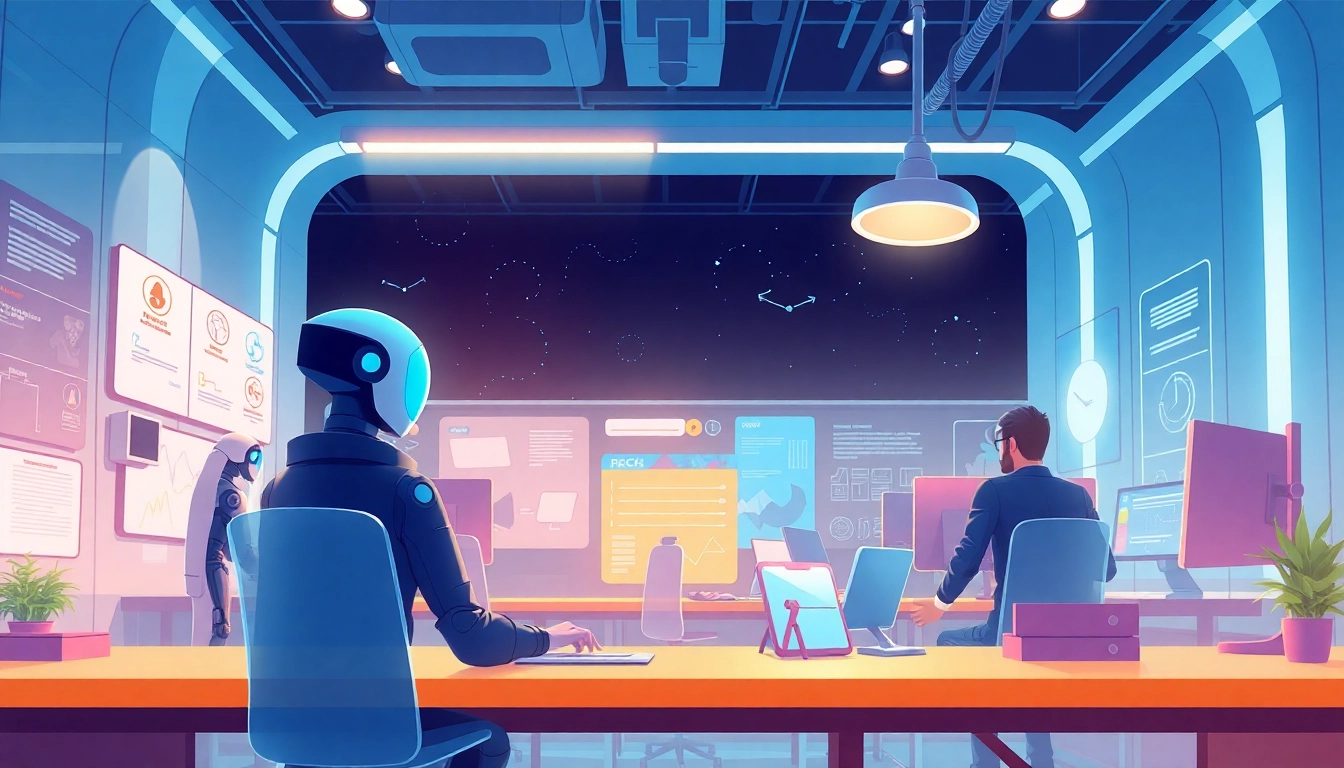The Role of AI Agents in Transforming Modern Workflows
Understanding AI Agents: Definition and Importance
What Are AI Agents?
AI agents are software systems that utilize artificial intelligence to pursue goals and perform tasks on behalf of users. These systems demonstrate reasoning, planning, and memory capabilities, which grant them a level of autonomy to make decisions, learn, and adapt over time. They can range from simple virtual assistants, such as chatbots, to complex systems capable of executing intricate processes without direct human involvement. AI agents are increasingly prevalent in various industries, enhancing efficiency and effectiveness in operations and customer interactions.
The Evolution of AI Agents
The concept of AI agents has evolved significantly since the inception of artificial intelligence itself. Early AI systems were rule-based and limited in scope, functioning primarily within predefined parameters. As machine learning and natural language processing advanced, so did the capabilities of AI agents. They began to integrate vast datasets, simulate human-like interactions, and perform multi-step reasoning processes. Today, AI agents can harness generative AI techniques, allowing them to create content, answer inquiries in real-time, and even develop creative solutions to complex problems.
Why AI Agents Matter for Businesses
For businesses, AI agents represent a crucial competitive advantage. They can facilitate customer service operations, automate repetitive tasks, and transform data into actionable insights. By deploying AI agents, organizations can enhance user experience, reduce operational costs, and increase productivity. The application of AI agents across sectors such as retail, healthcare, and finance demonstrates their versatility and efficacy, ensuring organizations can meet the demands of an increasingly digital marketplace.
Types of AI Agents and Their Applications
Simple Reflex and Model-Based Agents
Simple reflex agents operate on a set of condition-action rules. They react to specific stimuli from their environment without any memory of past states. For example, a simple reflex agent in a smart thermostatic system may turn on heating when a temperature sensor detects it is below a certain threshold.
Model-based agents, on the other hand, maintain a dynamic model of their environment. They can consider previous states when making decisions. These agents are superior in complex environments where past knowledge is crucial for performance. For instance, an AI-powered navigation assistant adjusts its route based on historical traffic patterns and real-time data, improving travel time accuracy.
Goal-Based AI Agents in Business
Goal-based agents have a specific objective or set of goals to achieve. They work by evaluating various strategies to meet their goals more efficiently. In business contexts, these agents can optimize processes such as supply chain management or customer relationship management by analyzing multiple variables and making data-driven decisions. For instance, goal-based AI agents in e-commerce settings can recommend products to users based on their past purchases, browsing habits, and current trends.
Learning Agents: The Future of AI
Learning agents are capable of improving their performance over time through experience. They utilize machine learning techniques to adapt their operations to achieve better results based on historical data. These agents can analyze trends, predict customer behavior, and adjust their strategies accordingly. For example, in marketing, learning agents may tailor advertising content to specific audience segments by recognizing patterns in user engagement, thereby enhancing campaign effectiveness.
How AI Agents Improve Efficiency and Productivity
Streamlining Workflows with AI Agents
AI agents can streamline workflows by automating time-consuming and repetitive tasks. This automation enables employees to concentrate on high-value activities that necessitate creativity and human insight while reducing the risk of error associated with manual processes. For example, in technical support, AI agents can handle routine inquiries, allowing human agents to address more complex issues that require nuanced understanding.
Real-World Examples of AI Agents in Action
Real-world applications of AI agents highlight their potential across various sectors. In healthcare, AI systems are being used to predict patient outcomes and suggest treatment plans by analyzing medical histories and real-time health data. In finance, robo-advisors use AI to offer personalized investment advice based on individual financial goals and risk tolerance. Furthermore, customer service chatbots, employed by numerous organizations, provide instant responses to user queries, driving customer satisfaction and loyalty.
Measuring the Impact of AI Agents on Performance
The impact of AI agents on business performance can be quantified using several metrics. Key performance indicators (KPIs) include increased efficiency rates, enhanced customer satisfaction scores, reduced operational costs, and improved sales figures. Businesses can also analyze the return on investment (ROI) associated with implementing AI solutions, demonstrating the tangible benefits of these technologies. For example, a retail company that employs AI agents for inventory management may see a significant increase in turnover and reduced waste due to enhanced supply chain transparency.
Integrating AI Agents into Your Business Strategy
Steps to Implement AI Agents in Your Organization
Integrating AI agents into a business strategy requires a structured approach. Key steps in this process include:
- Identify Objectives: Clearly define what you hope to achieve with AI agents, whether it’s increasing sales, improving customer service response times, or enhancing operational efficiency.
- Assess Current Systems: Analyze your existing systems and processes to determine how AI agents can be integrated or improve them.
- Select the Right Tools: Choose AI platforms and technologies that align with your goals and compatibility with your current systems.
- Develop a Pilot Project: Start small by implementing AI agents in a specific area, monitor performance, and identify improvements.
- Evaluate and Scale: Based on the outcomes from your pilot, refine your approach and scale the implementation across the organization.
Best Practices for Using AI Agents Effectively
To leverage AI agents effectively, businesses should adhere to best practices that enhance their functionality and value:
- Data Quality: Ensure the data fed into AI systems is accurate and up-to-date, as the performance of AI agents heavily relies on high-quality data.
- Continuous Training: Implement ongoing training sessions for AI agents to adapt to changes in user behavior and business environments.
- User Experience Design: Prioritize the design of AI agent interactions to ensure they are user-friendly and effectively meet customer needs.
- Feedback Loop: Establish mechanisms for users to provide feedback on AI agent interactions, using this data to continuously improve the system.
Common Challenges and Solutions with AI Agents
Implementing AI agents can present several challenges. Some common issues include:
- Resistance to Change: Employees may be hesitant to adopt new AI systems. Organizations should provide thorough training and communicate the benefits of AI agents to foster a culture of acceptance.
- Integration Difficulties: Integrating AI agents into existing structures can be complex. It’s essential to plan for interoperability and ensure compatibility with current processes.
- Data Security Concerns: Ensuring data privacy and security is paramount. Implement robust security measures and comply with regulations to safeguard sensitive information.
The Future Landscape of AI Agents
Predictions for AI Agents in 2025 and Beyond
As technology continues to advance, AI agents are projected to become increasingly sophisticated. By 2025, it is expected that AI agents will possess even greater levels of autonomy and decision-making capabilities. These agents may develop emotional intelligence, enabling them to comprehend and respond to human emotions effectively, thus improving interactions in customer service roles. Additionally, the integration of AI agents with other emerging technologies such as the Internet of Things (IoT) could create more adaptive and responsive systems that enhance workplace efficiency further.
Impact of AI on Job Markets and Skills Development
The rise of AI agents brings significant implications for job markets and skill requirements. While some roles may become obsolete due to automation, new opportunities will emerge that require human insight, creativity, and complex problem-solving abilities. As a result, continuous learning and skills development will be crucial in navigating the changing landscape. Organizations will need to invest in retraining programs that ensure employees can effectively collaborate with AI agents and leverage their capabilities to drive innovation.
Ethical Considerations for AI Agents in Society
With the increasing utilization of AI agents, ethical considerations are paramount. Issues such as data privacy, algorithmic bias, and the potential impact of AI-induced unemployment need to be addressed proactively. Developers and organizations must prioritize responsible AI practices, ensuring transparency in AI operations and creating frameworks that uphold ethical standards. Additionally, engaging in dialogue with stakeholders, including consumers and policymakers, will be essential to address societal concerns and enhance the public’s trust in AI technologies.














Post Comment